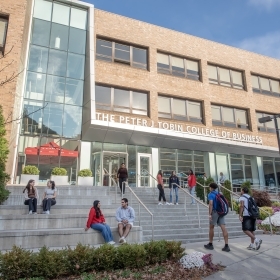Tips for Getting Accepted into College: Dispelling Common Myths

Applying to college can be a daunting task, especially with so many myths about college and misconceptions surrounding the process. Whether you’re anxious about choosing a major, affording tuition, fitting into a religious campus, or meeting academic requirements, it’s important to separate fact from fiction. Here are some college application tips that dispel common myths and provide clear, actionable advice.
Myth 1: I Need to Know What I’m Going to Major In Before I Apply
Reality: You don’t need to declare your major before applying to college. Many students start college undecided and use the opportunity to explore different fields. Universities like St. John’s offer exploratory programs that let you sample various courses, helping you discover your true interests or a major that could be an unexpected surprise. This flexibility ensures that you can find a path that aligns with your passions and career goals.
Is going into college undecided bad? Absolutely not. Being undecided can actually be beneficial, allowing you to explore and choose a major that suits you best. An inclusive campus environment and resources such as academic advisers are there to support your exploration. Plus, being undecided does not affect your eligibility for financial aid for college. Financial aid is based on need and academic performance, not your choice of major.
Myth 2: My Family Could Never Afford Tuition at a Private University
Reality: The cost of attending a private university can seem daunting, but this myth overlooks the extensive financial aid for college available. Private institutions, like St. John’s University, offer various forms of aid, including scholarships, grants, work-study programs, and need-based assistance. By completing the Free Application for Federal Student Aid (FAFSA) and other required forms, you can access financial resources that significantly reduce tuition costs. Financial aid packages can include scholarships based on academic achievement and financial need, as well as work-study opportunities that allow you to earn money while studying.
Financial aid helps make private education more accessible and manageable. Researching and applying for all available financial aid options is crucial to maximizing the support you receive. Additionally, exploring external scholarships and grants from organizations can further reduce your financial burden. With the right financial planning and resources, the cost of private university education becomes more attainable, enabling you to focus on successfully getting accepted into college and pursuing your academic goals.
Myth 3: You Have to Be Catholic to Go to a Catholic University
Reality: A common misconception is that you need to be Catholic to attend a Catholic university. In reality, institutions like St. John’s University are inclusive of students from all faiths and backgrounds. These universities are committed to creating an inclusive and supportive campus community where diversity in belief is celebrated.
So, do you have to be Catholic to go to a Catholic university? The answer is no. While Catholic universities are grounded in the principles of the Catholic faith, they welcome students regardless of their religious affiliation. You do not need to be Catholic to be admitted or to thrive at a Catholic university. Instead, these institutions offer a unique educational experience rooted in Catholic values and ethics, but embrace a variety of perspectives and backgrounds.
Attending a Catholic university can provide you with a distinctive outlook on ethical and social issues, while fostering a strong sense of community and shared values. This environment promotes personal growth and academic success among students from all walks of life. Your faith (or lack thereof) does not impact your chances of getting accepted into college at a Catholic institution. Focus on how you can contribute to and benefit from the university’s values-based education. The welcoming and diverse environment ensures that students of all faiths can find a place where they can excel and grow.
Myth 4: My Test Scores Are Too Low to Get into College
Reality: Many prospective students worry that low test scores will hinder their chances of getting accepted into college, but this is less of a concern with the rise of test-optional college admissions policies. Institutions like St. John’s University have adopted these policies to provide a more comprehensive view of applicants beyond standardized test scores. In a test-optional admissions process, your application is evaluated based on a variety of factors. These include your high school grade point average, extracurricular activities, personal statement, and letters of recommendation.
This holistic approach allows you to highlight your strengths and achievements in areas other than standardized testing. For instance, strong performance in challenging courses, leadership roles in extracurricular activities, and compelling personal essays can significantly enhance your application.
By focusing on these elements, you can showcase your unique qualities and experiences, providing a well-rounded picture of who you are as a student. This approach not only broadens the criteria for getting accepted into college, but also allows you to present a more complete and personalized application. So, if standardized test scores are not your strong suit, remember there are many other ways to demonstrate your potential and secure a place at your desired institution.
Myth 5: My Grades Are Not Good Enough to Get Into College
Reality: Think your grades might hold you back from getting accepted into college? Think again! Many colleges and universities, like St. John’s University, look at your academic history with a broader perspective. They understand that not all courses are the same and appreciate the effort you put into challenging subjects, even if the grades aren’t perfect. Your commitment to tackling tough coursework can highlight your dedication and readiness for college-level challenges.
Remember, admission teams consider more than just grades. They look at grade trends and any improvements you’ve made, as well as extenuating circumstances that may have affected your performance. If you’ve faced personal challenges or demonstrated growth over time, make sure to share this in your application. Your story of resilience can make a strong impact.
Don’t forget that financial aid for college and test-optional college admissions policies can also play in your favor. Financial aid is often based on need, and a compelling application can make a difference. Focus on showcasing your unique strengths, extracurricular achievements, and personal growth. By emphasizing these aspects, you can present a powerful case for getting accepted into college, no matter the academic hurdles you’ve faced.
Practical Tips for Getting Accepted into College
Start Early: Begin your college search and application process well in advance to understand each college’s requirements and gather the necessary materials. Early preparation helps you stay organized and reduces stress.
Focus on Extracurriculars: Get involved in clubs, sports, and volunteer work to showcase your leadership skills, passions, and community involvement. These activities strengthen your application beyond just academic achievements.
Craft a Strong Personal Statement: Use your personal statement to share your unique story, explain challenges, and highlight your achievements. This is your chance to demonstrate why you’re a great fit for the college and its inclusive campus environment.
Seek Recommendations: Obtain strong letters of recommendation from teachers, mentors, or employers who know you well and can speak to your strengths and character. These letters provide valuable insights into your personal and academic qualities.
Utilize Resources: Take advantage of college fairs, campus tours, and meetings with admission counselors. These resources can help you understand what each college offers, including financial aid for college and test-optional college admissions.
By following these college application tips, you can navigate the admission process effectively and enhance your chances of getting accepted into college. For a supportive and enriching experience, explore the opportunities at St. John’s University and see how our inclusive campus environment can help you succeed. Learn more about St. John’s today!





